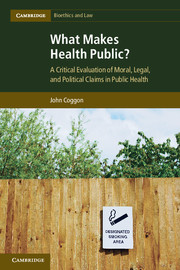 What Makes Health Public?
What Makes Health Public? from Part II - Evaluating evaluations: making health public
Published online by Cambridge University Press: 05 June 2012
The conceptual groundwork on public health law and ethics in Part I demonstrated the plural meanings of public health itself, and also raised the political connotations of an inquiry into the public nature of questions including ones relating to health. Part II has confirmed an earlier unproven thesis, that normative analysis of public health requires an assessment in the light of viable political norms, and thus a complete political framework to guide compelling conclusions. In other words, it is impossible to have a study ‘just’ of public health law and ethics: health is important, but public health raises political questions, and these can not be answered with just a partial view. It is therefore necessary to be clear what the political requires both for analytic study, and as a practical source of normativity.
For this reason, I have sought to establish why we would be interested in politics as opposed to morality: after all, a critique in ‘ethics’ seems to aspire to moral norms, and many critiques in health law are rooted explicitly in moral philosophy. Having established what political inquiry entails, in particular by emphasising its focus on issues relevant to and in light of the State, I have discussed anarchism. This is particularly instructive given debates that abound in moral and political philosophy about the difficulty of finding terms of legitimacy for the State. The nature of argumentation this inspires (regardless of whether it accords with my own presentation) is particularly instructive as it forces analysts to establish how and why they would make matters the subject of political – and thus public – concern. Some may remain an archists. Others will present arguments in favour of a political model, and in so doing they will develop their background account that will allow meaningful conclusions in public health law and ethics.
To save this book to your Kindle, first ensure no-reply@cambridge.org is added to your Approved Personal Document E-mail List under your Personal Document Settings on the Manage Your Content and Devices page of your Amazon account. Then enter the ‘name’ part of your Kindle email address below. Find out more about saving to your Kindle.
Note you can select to save to either the @free.kindle.com or @kindle.com variations. ‘@free.kindle.com’ emails are free but can only be saved to your device when it is connected to wi-fi. ‘@kindle.com’ emails can be delivered even when you are not connected to wi-fi, but note that service fees apply.
Find out more about the Kindle Personal Document Service.
To save content items to your account, please confirm that you agree to abide by our usage policies. If this is the first time you use this feature, you will be asked to authorise Cambridge Core to connect with your account. Find out more about saving content to Dropbox.
To save content items to your account, please confirm that you agree to abide by our usage policies. If this is the first time you use this feature, you will be asked to authorise Cambridge Core to connect with your account. Find out more about saving content to Google Drive.